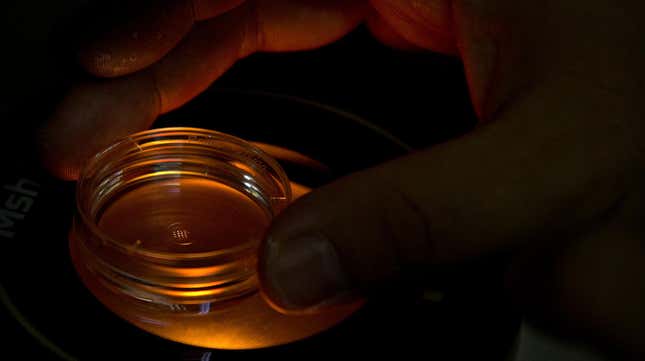
An expert committee says heritable genome editing of humans is still too risky and that the World Health Organization should take on a leading role when it comes to regulating this emerging biotechnology.
The new guidelines, announced on Monday, took two years for the expert advisory committee to put together, and they include a position paper on the matter of human gene editing and a proposed framework for global governance.
The World Health Organization assembled the committee in 2019 in response to a notorious science scandal involving He Jiankui, a biophysicist formerly with the Southern University of Science and Technology in Shenzhen, China. As the world learned in November 2018, the rogue scientist used the CRISPR gene editing tool to modify human embryos, resulting in the birth of twin girls with an apparent immunity to HIV. If this wasn’t shocking enough, He allegedly forged ethics documents and misled study participants. Chinese officials found He guilty of running an illegal experiment, and he’s currently serving a three-year prison sentence.
The scandal resulted in a public outcry, with some experts advocating for a moratorium on heritable human genome editing on account of the nascent state of the technology and unknown risks. At the same time, however, He’s experiment and the resulting conversation served as a reminder of the potential benefits, such as the prevention of deadly blood and brain disorders and the treatment of some cancers. He’s experiment also demonstrated the potential for conferring new capabilities altogether, such as immunity to dangerous pathogens or, more transhumanistically, higher IQs and athletic abilities.
As the report points out, gene editing comes in several varieties, including somatic and germline editing, the latter of which affects all cells belonging to an embryo, including sperm and egg cells. Edits to germline cells are controversial because they’re heritable, meaning the newly conferred traits would be passed down the next generation. Somatic modifications, which can affect local cells in the body, such as bone marrow, are not heritable and are not as controversial.
Regardless, the WHO committee expressed reservations about both types of gene editing. As committee member and chief scientist Soumya Swaminathan wrote in her forward to the new recommendations, “there are important areas of ongoing uncertainty as to potential benefits and risks, and gaps in scientific understanding in such key domains as off-target [unintended] effects and long-term risks.”
In its guidelines, the committee said it’s too soon to allow germline experiments like the one performed by He. This recommendation matches WHO’s existing position on the matter and the findings from a 2020 report compiled by the U.S. National Academy of Medicine, the U.S. National Academy of Sciences, and the UK Royal Society. The new report goes on to describe why the global governance of genome editing is required and why governments should clamp down and legislate tougher limits on human gene editing.
At the same time, the committee did not shy away from noting the potential benefits of genome editing, highlighting somatic gene therapies for the treatment of HIV, sickle-cell disease, and transthyretin amyloidosis (a slowly progressing disease of the nervous system).
“As global research delves deeper into the human genome, we must minimize risks and leverage ways that science can drive better health for everyone, everywhere,” said Swaminathan in a statement.
The committee recommends that WHO take on a leadership role when it comes to regulating genome editing, such as fostering international cooperation, supporting ethical reviews of genetics research, and advising governments in a way that ensures the coordination of international standards. The committee also stressed the importance of ensuring equal access to interventions arising from this research. Thorny issues having to do with intellectual property rights, the pricing of therapies, and ease of access, were also discussed.
“Human genome editing has the potential to advance our ability to treat and cure disease, but the full impact will only be realized if we deploy it for the benefit of all people, instead of fueling more health inequity between and within countries,” said Tedros Adhanom Ghebreyesus, director general of WHO, in the statement.
The committee presented several hypothetical scenarios involving the development of various gene therapies, including a problematic somatic therapy for treating sickle cell disease. The clinical trial for this pretend scenario was held in West Africa, where the disease is prominent. The exercise served as a warning, showing the emergence of a therapy for sickle cell disease in a location where it’s needed the most but where most people might not be able to afford it.
Leonard Zon, a gene therapy expert at Harvard University who wasn’t involved with the committee, told the New York Times that he’s “very supportive” of the recommendations made by this “thoughtful group.”
These are just recommendations, of course, and countries are not legally bound by them. It’s also not clear if anyone is listening. As Hank Greely, the director of the Stanford Center for Law and Biosciences, told STAT, “I’m not sure WHO has the reputation, or the political and bureaucratic flexibility and power to exercise the scientific and moral leadership this report calls on it to take.”
Governments will now have to decide how to move forward, but at least they can refer to these guidelines, which involved contributions from “hundreds of participants representing diverse perspectives from around the world, including scientists and researchers, patient groups, faith leaders and indigenous peoples,” according to the WHO statement.
More: What you’ll find inside medicine cabinets in 2030.